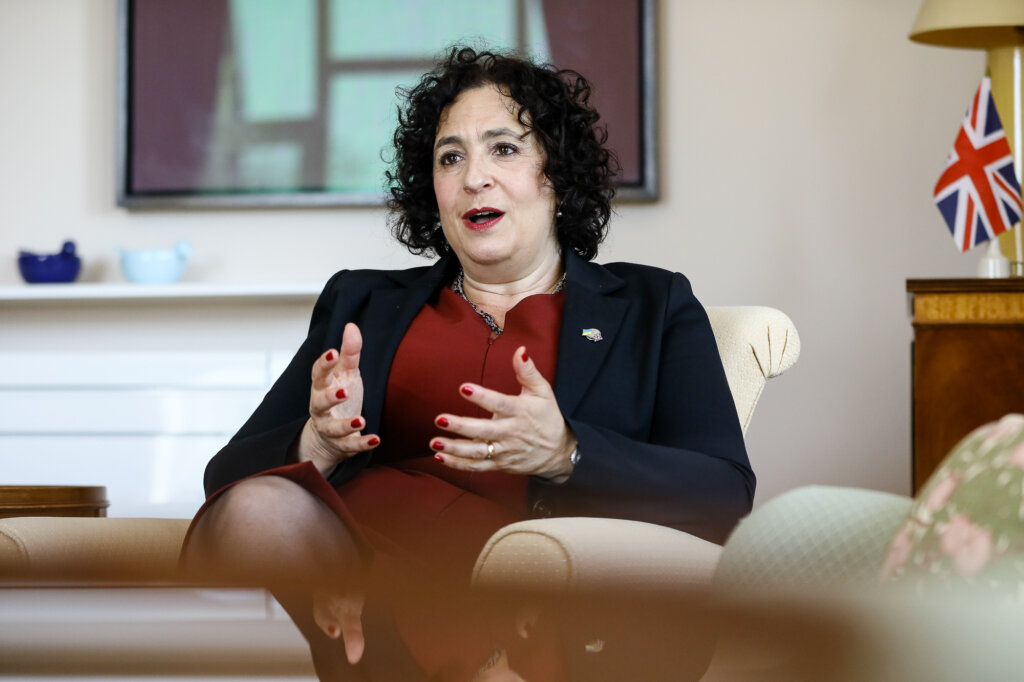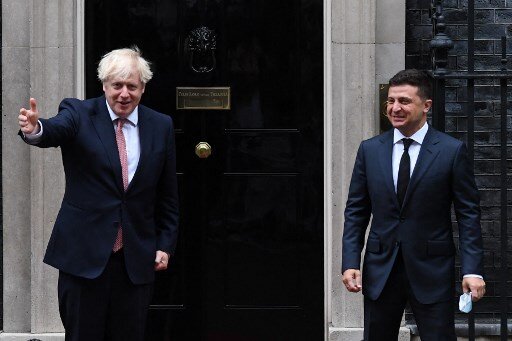Melinda Simmons, the United Kingdom’s ambassador to Ukraine, is back on the move again after more than a year of intermittent lockdowns and travel restrictions imposed by both countries.
She couldn’t be happier about her renewed mobility.
She and ambassadors from the other G7 countries recently returned to Kyiv from a Victory Day weekend visit to Luhansk Oblast, where they accompanied President Volodymyr Zelensky to learn how local officials and residents were coping with Russia’s war, now in its eighth year in the eastern Donbas region.
She is also looking forward to a rare visit home to London after the May 17 easing of the UK’s lockdown restrictions. She’s seen her husband only three times since the pandemic began, has barely been able to stay in touch with her two children, and is looking forward to being able to hug her parents. “It will be the most exciting trip ever,” she said.
See also: UK ambassador brings Ukrainian roots to the job
Climate change
Then in June, she hopes to pick up the pace of her travels around Ukraine with a visit to Ivano-Frankivsk, the regional capital that is home to 230,000 people located 600 kilometers southwest of Kyiv.
The visit will highlight the growing urgency of combatting global climate warming, which is particularly devastating for Ukraine in general and this region of western Ukraine in particular. The Ivano-Frankivsk region has suffered from floods due to deforestation.
The outreach is part of the buildup to the 26th United Nations Climate Change Conference of the Parties (COP26) in Glasgow, Scotland, from Nov. 1-12, 2021, hosted by the UK in partnership with Italy.
There is no time to waste, she told the Kyiv Post in an interview at the official residence of Her Majesty The Queen’s representative in Ukraine. “If you talk about climate change, people’s eyes glaze over,” Simmons said. “But if you talk about forest fires, flooding, deforestation, crop yields – the agrarian areas much more understand the impact on livelihoods.” Every corner of the planet, she said, “has to be part of the solution.”
She said the “average temperature rise in Ukraine is three times higher than anywhere else in Europe, and almost higher than anywhere else in the world,” threatening the nation’s health, the availability of clean drinking water, and agricultural production.
Ukraine’s progress in reducing carbon dioxide, the greenhouse gas responsible for global warming, is arduous because of the nation’s heavy reliance on fossil fuels, energy inefficiency, and outdated energy infrastructure.
“Ukraine’s long-term goal is to achieve carbon neutrality,” Zelensky said at the international Climate Ambition Summit on Dec. 12, 2020, a precursor event to COP26. Ukraine’s pledge is to reduce greenhouse gas emissions 60% by 2030 on the way to the international goal of carbon neutrality by 2050.

Ambassador of the United Kingdom in Ukraine Melinda Simmons talks with the Kyiv Post on May 11, 2021. (Oleg Petrasiuk)
Vaccines needed
The UK may have turned the corner in beating back the coronavirus, thanks to a massive vaccination campaign and tough lockdowns. But Simmons said that British citizens know that they aren’t safe until everyone in the world is safe – and that means a huge expansion of global vaccinations is in order. In fact, the UK has already discovered the new Indian variant of the virus in several regions.
“Everybody needs a vaccine,” she said. “That is why the UK has involved itself so heavily in the COVAX program,” the main organization for international vaccine distribution. COVAX hopes to distribute at least 1.3 billion doses worldwide by the end of this year, ramping up to 1.8 billion by early 2022.
Simmons said the wave of deaths and infections in India today is a horrifying example of what can happy in a country “where there is such inequality.” While she predicts the speedy development of vaccines “will be one of the biggest achievements of this century,” global cooperation will have to accelerate even further in developing and distributing vaccines that battle coronavirus variants as they arise.
But she said that supply is not enough if the logistics are lacking. She said that Ukraine is among the nations that need to focus on creating the infrastructure – proper storage, front-line nurses, and public information campaigns – to successfully inoculate the population. “That is the piece that has to be fixed,” she said.
Russia’s war
There’s been debate in the UK press over the nation’s weak response to the 2006 radioactive polonium-210 poisoning that killed Russian spy and defector Alexander Litvinenko, who co-authored a book accusing then-Russian Prime Minister Vladimir Putin of orchestrating a series of 1999 bomb blasts that killed more than 300 citizens in three Russian cities to justify the Kremlin’s Second Chechen War.
A public inquiry into Litvinenko’s murder was delayed until 2014. It launched soon after Russia was implicated in the shoot-down of Malaysian Airlines flight MH17, killing all 298 people on board with a Russian Buk missile over Kremlin-controlled territory in eastern Ukraine. Finally, in 2016, the UK inquiry concluded that Putin had “probably” sanctioned the assassination of Litvinenko.
“In the years since 2006, the Kremlin has acted in an increasingly brazen fashion. It has been to war with Georgia, annexed Crimea, invaded eastern Ukraine, intervened militarily in Syria, subverted democratic practices in the West and, in March (2018), poisoned Sergei and Yulia Skripal in Salisbury,” wrote Marina Litvinenko, Alexander’s widow, and Andrew Foxall in an op-ed published by The Times of London on July 17, 2018.
Whatever happened with the Litvinenko case, Simmons said the UK is taking Russia’s global threat seriously, especially since the poisoning on British soil of the Skripals in 2018, when UK citizen Dawn Sturgess was killed by inadvertent exposure to the Novichok nerve agent used in the attack.
In fact, the UK in April 2021 officially called Russia the “most acute threat” to its national security.
She said that the UK has adopted a legal framework for sanctions that mirrors US measures, making collective action easier if Russia crosses a “red line” by violating international law, committing human rights violations, or engaging in corrupt acts abroad.
The UK sanctions regime is “new and untested” so has been unable to have the “game-changing effect” of getting the Kremlin out of the eastern Donbas and Crimea. But just wait a bit longer, she said, for results. “We should have the same conversation in six or eight months and see how the sanctions regime is working.”

Britain’s Prime Minister Boris Johnson (L) greets President Volodymyr Zelensky outside number 10 Downing Street in central London on Oct. 8, 2020, prior to their meeting. (AFP)
Navy help
The UK’s Royal Navy has universally long been ranked as one of the top five in the world. The nation has a lot to teach Ukraine, whose navy – never very strong — lost much of its remaining capabilities following Russia’s illegal seizure of Crimea in 2014.
During a momentous meeting in London on Oct. 7-8, 2020, between Zelensky and UK Prime Minister Boris Johnson, the two signed a new bilateral free trade agreement as well as a memorandum of intent for closer defense cooperation.
The UK will help improve Ukraine’s shipbuilding capacity and will offer training on how to become a more agile force, Simmons said, since Ukraine will never be able to build enough ships to equal Russia’s fleet. Ukraine needs a credible threat to constant challenges from Russia that threaten Ukraine’s ability to freely navigate the Black and Azov seas.
Also, since the UK’s Operation Orbital training mission began in 2015, British troops have trained more than 20,000 members of the Ukrainian Armed Forces. The program has been extended to 2023.
Ukraine Crisis Media Center, citing the European Truth website, the memorandum calls for equipping Ukraine with eight up-to-date missile boasts compatible with NATO standards. The funding, according to the website, will come from a 10-year, $1.6 billion loan from the UK as well as additional UK funds to build the port infrastructure in Ochakiv that will serve as the base for the warships.
UK assistance to Ukraine runs at roughly $70 million a year. Simmons said that much of it will be immune from recent cuts in British foreign aid.
Ukraine & NATO, EU
Simmons said the best way for Ukraine to advance its ambitions for Western integration is to undertake reforms first – both in defense and in tackling corruption and establishing rule of law.
In defense, Ukraine still needs to make progress on such institutional reforms as transparent procurement and other benchmarks envisioned by Ukraine’s status as Enhanced Opportunity Partner with NATO. Seeking a NATO Membership Action Plan before such reforms are finished will provide “easy justification” for rejection by some NATO’s 30 members, she said. “Concentrate on the job,” she advised.
Also, Ukraine is “not there yet” in establishing the rule of law, protecting property rights, and transforming the judicial system into a trustworthy institution.
Ukraine-UK trade hovers at around the $2 billion a year mark – a low amount for nations with combined populations of nearly 110 million people. Despite interest among UK companies in Ukraine, “there is not a single company that doesn’t speak to me about rule of law.”
Johnson has appointed the first-ever UK trade envoy to Ukraine, Baroness Catherine Meyer. But the ambassador said that all her efforts to boost bilateral trade and investment “will not come to much if there is no rule of law.” To those ends, she and other G7 ambassadors, at the request of the Ukrainian government, outlined a roadmap for comprehensive judicial and anti-corruption reform on Jan. 25, 2021.
English-speaking nation
In March, Oleksiy Danilov, the secretary of Ukraine’s National Security and Defense Council, said that the nation needs to become fluent in the English language as a matter of national security.
“It is welcome,” Simmons said of Danilov’s pronouncement. “It just makes sense.”
She said the greater use of English will advance Ukraine’s European integration objectives for everything from travel to education and employment. The UK government-sponsored charity, the British Council Ukraine, has been working for nearly 30 years in the country to improve the English-language teaching curriculum in Ukrainian schools. It also offers classes and promotes the language.
Post-Brexit life
The UK left the European Union on Jan. 31, 2020, but no changes took place during a transition period that ended on Jan. 1, 2021, when rules governing the new relationship began. So Brexit is actually less than six months old.
“I think it is too early to assess Brexit,” Simmons said. “The pandemic has changed everything.”
